It looks like you're using an Ad Blocker.
Please white-list or disable AboveTopSecret.com in your ad-blocking tool.
Thank you.
Some features of ATS will be disabled while you continue to use an ad-blocker.
20
share:

Secret societies have been formed throughout history. Some of them by choice, some of them by necessity. The power of numbers is not a secret...yet how to use it is kept secret by them who truly wield it's power.
Nope... I'm not talking about that stuff. Just sometimes I like to give a "woo woo" intro.
Today on my, what has become a regular and quite painful, 3 a.m. awakening I went looking for secret codes. I did stumble onto some that I can not disclose here for fear of my life. Ok, that's not true, but it could be true, but it is not, I totally made that part up.
Anyhow, I found a code that has been active since the late 1800's at least....the Hobo code. I got a pretty good introduction into the life of a hobo by reading through the articles. And I thought it would be good to give you a basic rundown of what I found before I got into the code itself. I thought it was interesting, hopefully you will as well.
Hobo Etymology
Everywhere I looked the source of the word is unknown. I found this though:
Only two things are “certain” and “known” about hobo: the word was noticed around 1890, and it emerged in American English. Hobos were migratory workers in the western (perhaps, to be more precise, in the northwestern) parts of the United States. The cruelest definition of hobo appeared in the 1893 edition of The Standard Dictionary (Funk and Wagnalls) and stayed in this reference work for decades: “An idle, shiftless wandering workman, ranking scarcely above the tramp.” ...
There are some pretty interesting tales/theories as to how it came into existence that I ran across as well. These are only suppositions, none are known to be fact:
The term “hobo” is first attested in print in the late 1800s in the Pacific Northwest, and almost immediately theories arose as to its origin. The English dialect terms “hawbuck” and “hawbaw,” meaning “an unmannerly lout” (Oxford English Dictionary) have been proposed as sources, but England was a world away from the Northwest US in those days. A more logical local source may have been the greeting shout “Ho, boy!” apparently common among railroad workers at the time. There’s also a suggestion that “hobo” is short for “hopping boxcars,” and some maintain that “hobo” is short for Hoboken, NJ, where many rail lines converged in the 19th century, making the city a natural gathering point for vagabonds.
While we may never pin down the origin of “hobo” with absolute certainty, my money is riding on that “Ho, boy!” shout, which was verifiably in use by railway workers at the time and could easily have been adopted as a name for their vagabond passengers. ...
Another that I found:
“In the old days when most of the boys were working in the agricultural section of the West, they were referred to as just ‘boys.’ Then, to distinguish them from other workers, the name of one of their tools, the hoe, was applied to them and they became ‘hoe-boys.’ From that it was only one step to ‘hoboes.’ ” ...
So, the mystery deepens! Not only do they have a secret language, they also have unknown origins! Not really, their origins are known, just how the name came into existence is not.
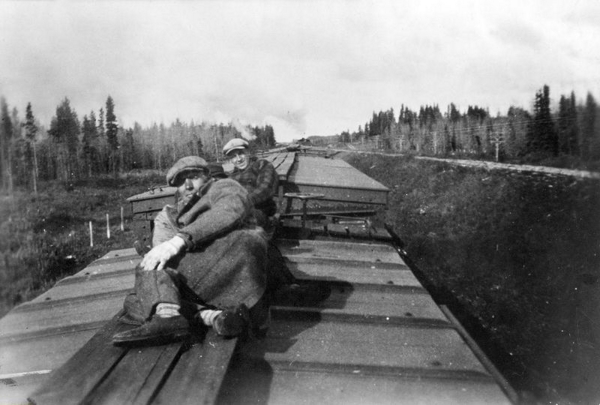
Hobo History
The Hobo population really began to boom between the civil war and the great depression. As jobs became harder and harder to come by, many men took to traveling from town to town to survive. Train hopping was a popular form of travel for these men who had no other quick means of transportation to get from one place to another to find work.
Often, they would take the odd jobs that no one else could or would do. And they were labeled as migrant workers. Although, I am not too sure if that is what they really were.
It wasn’t just grown men and woman out learning the code. With funding cut, schools were out of session and children were restless. As a way to help their families escape a life of poverty, many 15 and 16-year-olds began adopting the odd job lifestyle. It’s estimated that there were 250,000 teenage hobos zigzagging the rails in America from the late ’20s to early ’40s. ...
I do know that they were the worker population of the homeless world. These were not the tramps or bums that ran away from hard manual labor. Hobos were the ones who sought it out. The ones willing to take the crap jobs, the ones willing to work for a days meal and for a night with a roof over their head.
Some of the work they performed around the country, as they traveled was agriculture, bridges, railroads and more:
In the 1890s a distinct hobo subculture emerged within America's working class. As America industrialized, there was a huge need to create an infrastructure of railroads, bridges, commercial one-crop agriculture, and even new towns out west that would serve as an economic base for the growing cities and their manufacturing. Not only were workers needed to lay and repair railroad track, build bridges, and harvest grain, but those activities created a need for lumber and iron ore to build the tracks and machines, creating even more jobs in unsettled areas. Much of the work was both necessary and inherently temporary. Who was to fill such a vital labor market niche? Most newly arriving immigrants settled in cities, and because the need for xv mobility meant a need for fluent English, the work was left to American-born workers or immigrants from the British Isles; in short, to hoboes. And despite the fact that contemporary social reformers could not see it, there is no question that hoboes were workers; indeed, as Charlie once remarked, "Who else but a hobo would travel a thousand miles to make a dollar a day harvesting wheat?" ...
If you care to learn more about their history and life, the link above is a 254 page book called Tales of The American Hobo . It gives some good background/history on who they are and some interesting tales as well.
This is just a short and sweet summery. Honestly, these guys had conventions and meetings, they helped build and repair the railroad, they did a lot for the country from what I read. And it is too much for me to cover here...but I felt that it needed to be at least mentioned before I went onto the real reason for this post.
Ok..so, That was all a little background to get to the real reason I wrote this thread....
Continued...
edit on 7-11-2017 by blend57 because: Always an edit : /

The secret code of Hobos.
Throughout the years of traveling from town to town, city to city to look for work, Hobos have developed their own form a language. Well, it's a code honestly. Little markings that they would draw near a place to tell other travelers what they can expect from it. Such symbols could denote where to get a meal, if someone was kind, whether water was safe to drink or not, etc..
Most of the populace wouldn't notice these subtle symbols written on sidewalks, under bridges, and on walls. But a hobo will look for them because the symbols help them find or access things that are pivotal to their survival. This is the code (or partial code) that they use:
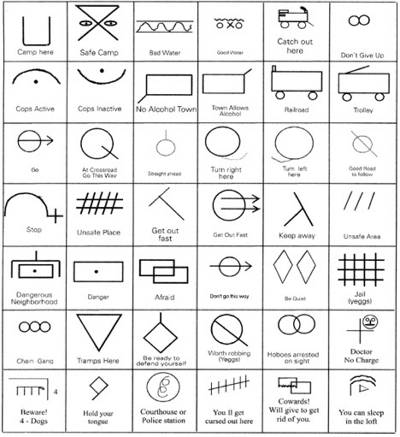
That's not the whole list though. There are other symbols that have replaced the older ones or some symbols have changed meaning. It seems the "language" is constantly evolving just as our spoken language does. A pic of an older version:
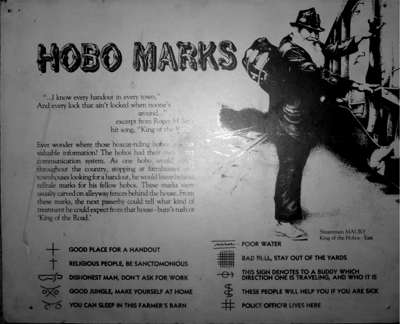
It was thought to be developed after the civil war, in the late 1800's. A lot of the military personnel had come back from service and found that jobs were scarce. They started to travel by use of rail ways from city to city to find work. Because of the severe lifestyle they led, they developed the code to help each other on their travels. I would imagine it was very helpful during the depression when so many young teenagers were living the hobo life as well.
In the 20th century, hobo's and the code were thought to have been lost. But that is not entirely true. Many of the homeless population have adopted the code for use in today's world. There are still people who travel around the country and look for work as well. And the code lives on. But maybe, just with a bit of a modern twist to it.
That's right, the code has become high tech. Although you may still find some of the old symbols scribbled onto the telephone polls or sidewalks, it seems that as the world becomes more connected, so does the hobo/homeless community.
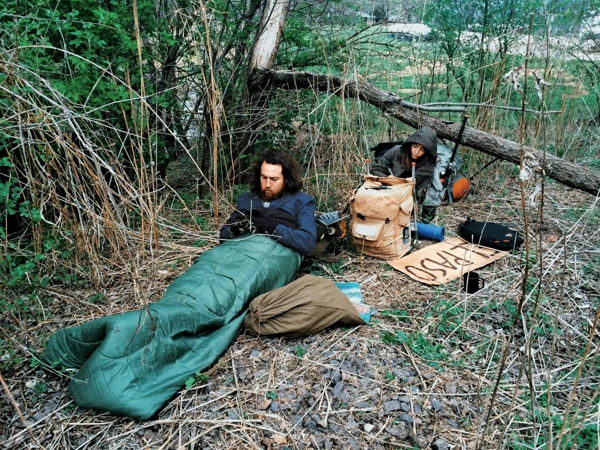
The New Code
A new way to use the code has emerged via cell phones. Many new apps and forums have sprang up and are being utilized to help the nomads as they travel from area to area. Cell phones are cheap now and free WiFi is almost everywhere and they've become a new survival tool that every hobo that can afford one keeps in their bag.
Simple things like the weather app, gps, and google have helped them navigate their way across the country. Telling them when to find shelter because of rain or snow, knowing how many miles to the nearest town, even finding out where the nearest homeless shelter/food bank is.
Other sites like craiglist are used to look for work, dumpstermap which tells where the best dumpster diving spots are, and WiFifreespot locators are indispensable to them.
Modern technology has also given them a way to have a voice which, previously, they did not. With the anonymity of the internet, they are able to be judged for their words and communicate with all members of society. Without being judged for their appearance or social standing.
All this new tech is leading to...a new code. One that is being developed by the modern day Hobo. And one that won't be revealed to the masses, at least not willingly. At least he says that the code is meant for them, and not for the general public.
When hobo codes become commonly known by regulars, it’s a problem. “The codes are for us,” he says, “and if other people see it, they could have clues to our secrets, and the next thing you know, that outlet that was accessible to hobos is now locked up or completely gone.” ...
But I did find one high tech version that has been revealed. A digital code to take the place of the old one. Whether or not this is the one being used, I don't know. I also don't know if this is the one the hobo developed in the last link (it was a 2015 article).
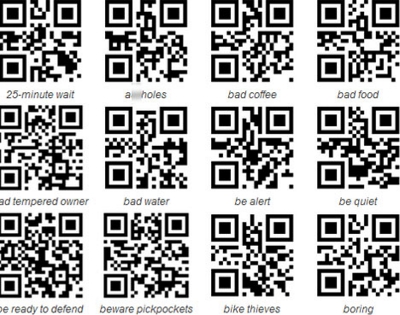
These stencils can be understood as a covert markup scheme for urban spaces — providing directions, information, and warnings to digital nomads and other indigenterati. We present these as modern equivalents of the chalk-based "hobo signs" developed by 19th century vagabonds and migratory workers to cope with the difficulty of nomadic life. Indeed, our set of QR stencils port a number of classic hobo annotations to the QR format ("turn right here", "dangerous dog", "food for work") as well as some new ones, with a nod to warchalking, that are specific to contemporary conditions ("insecure wifi", "hidden cameras", "vegans beware"). ...
So, the Hobo's code was never really lost it seems. Possibly kept hidden from the general public for a while though.
If anyone is interested, hobos also have a code of ethics as well, which can be found here.
Anyways, just a quick thread on a subject matter I never explored before. There is a ton more info to be found at the links provided on hobos in general.
Thanks for taking the time to read through it and as always, I hope you found something useful.
blend57
Sources:
weburbanist
Newsweek
Tales of a Hobo
Washington Post
word detective
edit on 7-11-2017 by blend57 because: Always an edit : /
a reply to: blend57
Nice thread!
There are similar stories in the UK about gypsies marking houses letting other traveller types know if the property is friendly, big dog or worth robbing ect.
I do not know if there is truth in the rumours or if it was made up and based on the hobo code in your thread.
I might look into it and find out.
Nice thread!
There are similar stories in the UK about gypsies marking houses letting other traveller types know if the property is friendly, big dog or worth robbing ect.
I do not know if there is truth in the rumours or if it was made up and based on the hobo code in your thread.
I might look into it and find out.
Fascinating and very well done, OP. Thank you.
The hi-tech aspect really brought it up to date too. Now I gotta check out that dumpster-diving map lol...
The hi-tech aspect really brought it up to date too. Now I gotta check out that dumpster-diving map lol...
a reply to: blend57
I traveled by foot for a while during my Kerouac On the Road days all over the country. Here's one of the best resources for modern day hobos:
squattheplanet.com...
Everyone from rubber tramps (people who travel by car) leather tramps (people who travel by foot) to boat punks (a group of punk rock people who fix up old boats and travel the world). Full of tips, tricks, and good 'ol travel stories.
I traveled by foot for a while during my Kerouac On the Road days all over the country. Here's one of the best resources for modern day hobos:
squattheplanet.com...
Everyone from rubber tramps (people who travel by car) leather tramps (people who travel by foot) to boat punks (a group of punk rock people who fix up old boats and travel the world). Full of tips, tricks, and good 'ol travel stories.
I just wanted to add, a lot of people don't believe this world still exists, but it does. For a lot of people it's a choice, and one that's better
than the 9-5 grind most people are forced into out of necessity.
I was living in an old hotel on the edge of North Beach and Chinatown in San Francisco, and there was always this same old homeless man in the same spot on the street I lived on. He'd walk around the city, but always come back to that same spot to sleep, eat, whatever. Then one day I didn't see him anymore. Picking up the newspaper a day or two later, I saw an article about him being ran over by a car. He didn't make it.
About a week after that as I was walking down the street I saw that the guys family had erected a homemade sign in his spot on the sidewalk. It was filled with pictures of him, his family, and who he was. Turns out he was a graduate of Harvard, had a PhD and all kinds of other titles. In one of the notes from his family they said they constantly pleaded with him to come back but he wasn't having it. He liked living like that, it was his choice. And they supported him.
It made me think about how many people avert their eyes every time they pass a homeless person and instantly classify them as a druggie, psycho, or worse. When a lot of times that couldn't be further from the truth.
I was living in an old hotel on the edge of North Beach and Chinatown in San Francisco, and there was always this same old homeless man in the same spot on the street I lived on. He'd walk around the city, but always come back to that same spot to sleep, eat, whatever. Then one day I didn't see him anymore. Picking up the newspaper a day or two later, I saw an article about him being ran over by a car. He didn't make it.
About a week after that as I was walking down the street I saw that the guys family had erected a homemade sign in his spot on the sidewalk. It was filled with pictures of him, his family, and who he was. Turns out he was a graduate of Harvard, had a PhD and all kinds of other titles. In one of the notes from his family they said they constantly pleaded with him to come back but he wasn't having it. He liked living like that, it was his choice. And they supported him.
It made me think about how many people avert their eyes every time they pass a homeless person and instantly classify them as a druggie, psycho, or worse. When a lot of times that couldn't be further from the truth.
It's nice that they still managed to encourage each other, and try to help out with friendly tips. I like "you can sleep in the loft", and indicating
where a free medical clinic was located. They were like a community.
Cool thread. Hope you sleep better. Insomnia is no fun.
For you: zzzzzzzzzzz and lots more ZZZZZZZZZZZZZZ's and a snort!
Cool thread. Hope you sleep better. Insomnia is no fun.
For you: zzzzzzzzzzz and lots more ZZZZZZZZZZZZZZ's and a snort!
a reply to: blend57
Very interesting thread, and quite a lot of information, and even humor!
I remember hearing about hobos as a child, and they were discussed, then, as people who would travel around, and didn't stick to one place. Being "homeless" wasn't mentioned, as much as choosing to live that way, as best I recall. Then again, I don't remember ever seeing a person living on the streets, when I was a child, either. Maybe they just weren't where we went, but I don't recall it being as big an issue then. Perhaps it was, and just wasn't as recognized?
Very interesting thread, and quite a lot of information, and even humor!
I remember hearing about hobos as a child, and they were discussed, then, as people who would travel around, and didn't stick to one place. Being "homeless" wasn't mentioned, as much as choosing to live that way, as best I recall. Then again, I don't remember ever seeing a person living on the streets, when I was a child, either. Maybe they just weren't where we went, but I don't recall it being as big an issue then. Perhaps it was, and just wasn't as recognized?
Hey you Blend! I was going to say, ya know, if you want to see what it's like to be a hobo for a few days, I'll go with you.
We could hop a freight train, and ride the rails baby! Play the harmonica and write hobo songs .... "we smoke old stogies we have found, short, but not too big around..... man of means by no means, King of the Road! lol.
But then I thought about it. Sadly, it ended with all the other hobos wanting to be near us, and giving us scabies and stealing our jewelry.
Sigh.
We could hop a freight train, and ride the rails baby! Play the harmonica and write hobo songs .... "we smoke old stogies we have found, short, but not too big around..... man of means by no means, King of the Road! lol.
But then I thought about it. Sadly, it ended with all the other hobos wanting to be near us, and giving us scabies and stealing our jewelry.
Sigh.
a reply to: angeldoll
LOL! That tune has been running through my mind the whole time I was reading the article. I loved that song when was a kid. I think it was on my K-Tell Truck Drivers Songs Album.
King of the Road Lyrics
-dex
"we smoke old stogies we have found, short, but not too big around..... man of means by no means, King of the Road!
LOL! That tune has been running through my mind the whole time I was reading the article. I loved that song when was a kid. I think it was on my K-Tell Truck Drivers Songs Album.
Trailer for sale or rent, rooms to let, fifty cents.
No phone, no pool, no pets, I ain't got no cigarettes
Ah, but, two hours of pushin' broom
Buys an eight by twelve four-bit room
I'm a man of means by no means, king of the road.
King of the Road Lyrics
-dex
a reply to: blend57
My father was one of those hobos back in the 1920's and 1930's. There's not a lot of information about where all he went, or what jobs he had. But he picked up a lot of skills along the way. He could build or fix just about anything. I was born very late in his life.
I interviewed my father's sister several years ago. She said that as soon as my father came of age, he started hopping trains and went off on his adventure. They lost track of him for several years. He was nowhere to be found in the 1920 census. But I found him in the 1930 census in Ohio. He was chauffeur for a rich doctor.
Your article was a fascinating read. I could imagine what my father must have been up to for those years while he road the rails.
Thanks
-dex
My father was one of those hobos back in the 1920's and 1930's. There's not a lot of information about where all he went, or what jobs he had. But he picked up a lot of skills along the way. He could build or fix just about anything. I was born very late in his life.
I interviewed my father's sister several years ago. She said that as soon as my father came of age, he started hopping trains and went off on his adventure. They lost track of him for several years. He was nowhere to be found in the 1920 census. But I found him in the 1930 census in Ohio. He was chauffeur for a rich doctor.
Your article was a fascinating read. I could imagine what my father must have been up to for those years while he road the rails.
Thanks
-dex
originally posted by: DexterRiley
a reply to: blend57
My father was one of those hobos back in the 1920's and 1930's. There's not a lot of information about where all he went, or what jobs he had. But he picked up a lot of skills along the way. He could build or fix just about anything. I was born very late in his life.
I guess a lot of people were Hobo's back then. The 30's was the depression era. Was he one of those affected by that? They said that some people just love the life style. And that's the reason people still choose it today...it's just right for them. (there are the ones that have no choice though)
originally posted by: angeldoll
"we smoke old stogies we have found, short, but not too big around..... man of means by no means, King of the Road! lol.
For you: zzzzzzzzzzz and lots more ZZZZZZZZZZZZZZ's and a snort!
Thanks! I need the zzzz's! I used to love that song when I was really, really little. Maybe I was meant to ride the rails! It would be fun for a couple days honestly. But then, they talk about how dangerous it is. People losing limbs, drug abusers and stuff. For awhile there was a rail gang! I need all my fingers and toes.
Maybe we can watch a documentary on it instead?
originally posted by: LadyGreenEyes
Very interesting thread, and quite a lot of information, and even humor!
Sometimes I can be funny (not really). Lack of sleep does strange things to you I guess.
originally posted by: underwerks
I just wanted to add, a lot of people don't believe this world still exists, but it does. For a lot of people it's a choice, and one that's better than the 9-5 grind most people are forced into out of necessity.
It made me think about how many people avert their eyes every time they pass a homeless person and instantly classify them as a druggie, psycho, or worse. When a lot of times that couldn't be further from the truth.
I can see how people would choose this life! And I don't understand classifying them as "druggies" and such. A man in a 3 piece suit working on wall street can be just as big a druggie as anyone else. I've never understood what the difference between the two were really. Maybe someday I'll figure that out. (I know, money..but at the most basic level, what's the difference?)
originally posted by: JAGStorm
When I lived in Central Florida there was a village of Hobos living behind the Home Depot. I am not even kidding when I say they had a Hobo mayor!
Lol. I guess I don't know what to say. On the one hand I'm thinking "wow, that's a bit weird!". and then I think about how they have an annual hobo convention and a code of ethics all hobos are bound by and I think "well, it kind of makes sense they'd have a mayor".
originally posted by: nonspecific
There are similar stories in the UK about gypsies marking houses letting other traveller types know if the property is friendly, big dog or worth robbing ect.
When I was reading through this stuff I thought about how similar they were to gypsies. I read about those a few years back. They have a very fascinating history. Anyhow, there were a lot of parallels, as you said.
Thanks to everyone for the comments and additional information! I think that's the best part about making a thread. Reading and hearing the personal accounts/thoughts of posters afterwards. I like seeing other peoples perspectives I guess.
Thanks again!
blend
Where I hike on the GAP I see both "through hikers" and messages. The one that's very clear is a sign saying the nearby restaurant is safe and will
feed you for free.
When the weather is good the times people get out is very consistent, so you see the same people. It's also very easy to notice when the person you just greeted is dirty wearing high end outdoor clothes. That sounds judgemental, but there is a difference between a brand junky and an ultra light hiker even.
My rambling point is, hobos don't really have a look anymore. They look like anyone that decided to walk their route on the trail rather than the road.
Those of us on the trail for exercise have a distinct look though.
When the weather is good the times people get out is very consistent, so you see the same people. It's also very easy to notice when the person you just greeted is dirty wearing high end outdoor clothes. That sounds judgemental, but there is a difference between a brand junky and an ultra light hiker even.
My rambling point is, hobos don't really have a look anymore. They look like anyone that decided to walk their route on the trail rather than the road.
Those of us on the trail for exercise have a distinct look though.
Wow -if only homelessness and transient nature were this ideologically romanticized. Good article just not the modern reality of the way things are.
Lol.....the painfull 3am awakening.....lol.....4:44 for me for 30 years......lol.....I empathise......I find myself up learning things at the weirdest
times.
edit on 8-11-2017 by one4all because: (no reason given)
Just saying as the homeless people I have seen and known are more concerned with: clothing, food, and shelter.
Same thing applies to transients as well. Most of the techo-hobos/transients aren't really that at all.
Occam's Razor is an amazing thing when you apply it to reasoning, logic, and reality.
Same thing applies to transients as well. Most of the techo-hobos/transients aren't really that at all.
Occam's Razor is an amazing thing when you apply it to reasoning, logic, and reality.
new topics
-
Las Vegas UFO Spotting Teen Traumatized by Demon Creature in Backyard
Aliens and UFOs: 1 minutes ago -
2024 Pigeon Forge Rod Run - On the Strip (Video made for you)
Automotive Discussion: 50 minutes ago -
Gaza Terrorists Attack US Humanitarian Pier During Construction
Middle East Issues: 1 hours ago -
The functionality of boldening and italics is clunky and no post char limit warning?
ATS Freshman's Forum: 2 hours ago -
Meadows, Giuliani Among 11 Indicted in Arizona in Latest 2020 Election Subversion Case
Mainstream News: 2 hours ago -
Massachusetts Drag Queen Leads Young Kids in Free Palestine Chant
Social Issues and Civil Unrest: 3 hours ago -
Weinstein's conviction overturned
Mainstream News: 4 hours ago -
Supreme Court Oral Arguments 4.25.2024 - Are PRESIDENTS IMMUNE From Later Being Prosecuted.
Above Politics: 6 hours ago -
Krystalnacht on today's most elite Universities?
Social Issues and Civil Unrest: 6 hours ago -
Chris Christie Wishes Death Upon Trump and Ramaswamy
Politicians & People: 6 hours ago
top topics
-
Krystalnacht on today's most elite Universities?
Social Issues and Civil Unrest: 6 hours ago, 8 flags -
Weinstein's conviction overturned
Mainstream News: 4 hours ago, 6 flags -
Supreme Court Oral Arguments 4.25.2024 - Are PRESIDENTS IMMUNE From Later Being Prosecuted.
Above Politics: 6 hours ago, 5 flags -
University of Texas Instantly Shuts Down Anti Israel Protests
Education and Media: 8 hours ago, 5 flags -
Massachusetts Drag Queen Leads Young Kids in Free Palestine Chant
Social Issues and Civil Unrest: 3 hours ago, 4 flags -
Meadows, Giuliani Among 11 Indicted in Arizona in Latest 2020 Election Subversion Case
Mainstream News: 2 hours ago, 4 flags -
Chris Christie Wishes Death Upon Trump and Ramaswamy
Politicians & People: 6 hours ago, 2 flags -
Any one suspicious of fever promotions events, major investor Goldman Sachs card only.
The Gray Area: 10 hours ago, 2 flags -
Gaza Terrorists Attack US Humanitarian Pier During Construction
Middle East Issues: 1 hours ago, 2 flags -
2024 Pigeon Forge Rod Run - On the Strip (Video made for you)
Automotive Discussion: 50 minutes ago, 1 flags
active topics
-
University of Texas Instantly Shuts Down Anti Israel Protests
Education and Media • 182 • : JAY1980 -
Las Vegas UFO Spotting Teen Traumatized by Demon Creature in Backyard
Aliens and UFOs • 0 • : FlyersFan -
Candidate TRUMP Now Has Crazy Judge JUAN MERCHAN After Him - The Stormy Daniels Hush-Money Case.
Political Conspiracies • 778 • : Annee -
Supreme Court Oral Arguments 4.25.2024 - Are PRESIDENTS IMMUNE From Later Being Prosecuted.
Above Politics • 59 • : xuenchen -
Breaking Baltimore, ship brings down bridge, mass casualties
Other Current Events • 489 • : Threadbarer -
-@TH3WH17ERABB17- -Q- ---TIME TO SHOW THE WORLD--- -Part- --44--
Dissecting Disinformation • 679 • : McTech2 -
Gaza Terrorists Attack US Humanitarian Pier During Construction
Middle East Issues • 15 • : Irishhaf -
Massachusetts Drag Queen Leads Young Kids in Free Palestine Chant
Social Issues and Civil Unrest • 9 • : theatreboy -
Meadows, Giuliani Among 11 Indicted in Arizona in Latest 2020 Election Subversion Case
Mainstream News • 5 • : Disgusted123 -
God's Righteousness is Greater than Our Wrath
Religion, Faith, And Theology • 29 • : Topcraft
20
